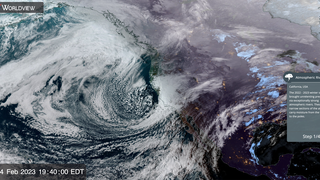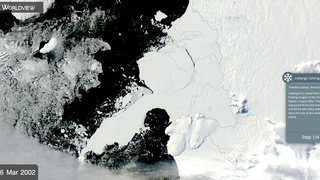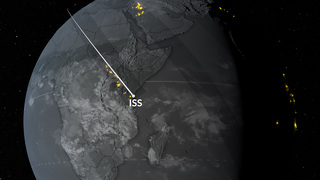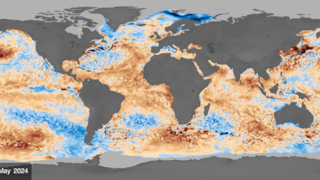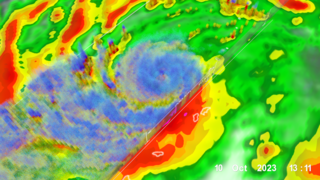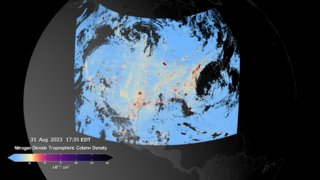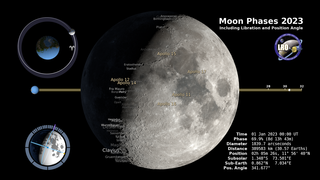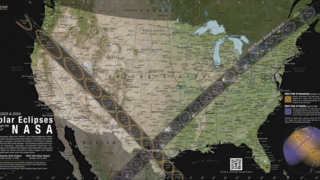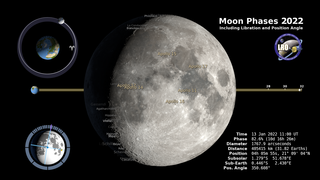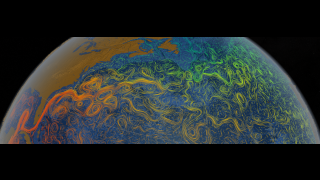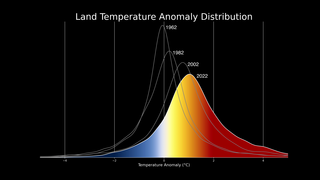Earth
ID: 3096
The Earth's climate is determined by energy transfer from the sun to the Earth's land, oceans, and atmosphere. As the Earth rotates, the sun lights up only part of the Earth at a time, and some of that incoming solar energy is reflected and some is absorbed, depending on type of area it lights. The average amount of reflection and absorption is critical to the climate, because the absorbed energy heats up the Earth until it is radiated away as thermal radiation. This animation shows the monthly average clear-sky outgoing shortwave radiation from July, 2002 through June, 2004 as measured by the CERES instrument. This is the sunlight that is directly reflected back into space by ice, desert, and other physical areas on the Earth when the sky is cloud-free. The ice sheets can be clearly seen to reflect the most sunlight, with desert areas next. Oceans absorb the most sunlight, more than the vegetated land areas such as the tropical rain forest and temperate forests and plains.

Average Clear-sky Outgoing Shortwave Flux (WMS)

For More Information
Visualization Credits
Horace Mitchell (NASA/GSFC): Lead Animator
Eric Sokolowsky (GST): Animator
Bruce A. Wielicki (NASA/LaRC): Scientist
Eric Sokolowsky (GST): Animator
Bruce A. Wielicki (NASA/LaRC): Scientist
Please give credit for this item to:
NASA/Goddard Space Flight Center Scientific Visualization Studio
NASA/Goddard Space Flight Center Scientific Visualization Studio
Short URL to share this page:
https://svs.gsfc.nasa.gov/3096
Data Used:
Note: While we identify the data sets used in these visualizations, we do not store any further details nor the data sets themselves on our site.
Dates of Data Used:
2002/07/01-2004/06/30
This item is part of this series:
WMS
Keywords:
GCMD >> Earth Science >> Atmosphere >> Atmospheric Radiation >> Shortwave Radiation
GCMD >> Earth Science >> Oceans >> Ocean Heat Budget >> Shortwave Radiation
SVS >> CERES
NASA Science >> Earth
GCMD keywords can be found on the Internet with the following citation: Olsen, L.M., G. Major, K. Shein, J. Scialdone, S. Ritz, T. Stevens, M. Morahan, A. Aleman, R. Vogel, S. Leicester, H. Weir, M. Meaux, S. Grebas, C.Solomon, M. Holland, T. Northcutt, R. A. Restrepo, R. Bilodeau, 2013. NASA/Global Change Master Directory (GCMD) Earth Science Keywords. Version 8.0.0.0.0
https://svs.gsfc.nasa.gov/3096
Data Used:
Aqua/CERES/Outgoing Shortwave Radiation Flux
2002/07/01-2004/06/30Dates of Data Used:
2002/07/01-2004/06/30
This item is part of this series:
WMS
Keywords:
GCMD >> Earth Science >> Atmosphere >> Atmospheric Radiation >> Shortwave Radiation
GCMD >> Earth Science >> Oceans >> Ocean Heat Budget >> Shortwave Radiation
SVS >> CERES
NASA Science >> Earth
GCMD keywords can be found on the Internet with the following citation: Olsen, L.M., G. Major, K. Shein, J. Scialdone, S. Ritz, T. Stevens, M. Morahan, A. Aleman, R. Vogel, S. Leicester, H. Weir, M. Meaux, S. Grebas, C.Solomon, M. Holland, T. Northcutt, R. A. Restrepo, R. Bilodeau, 2013. NASA/Global Change Master Directory (GCMD) Earth Science Keywords. Version 8.0.0.0.0
